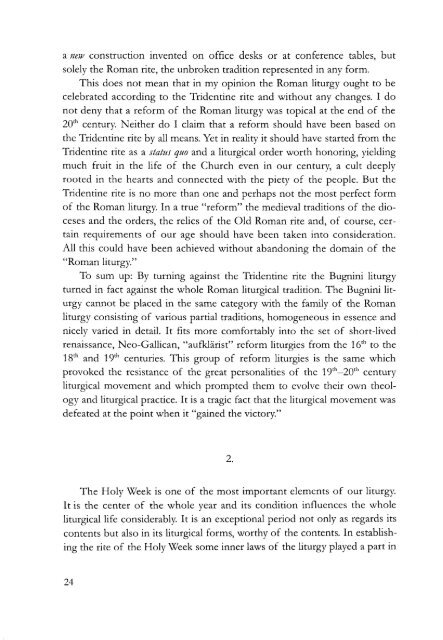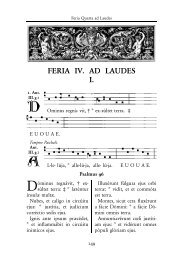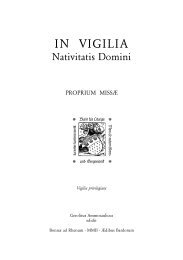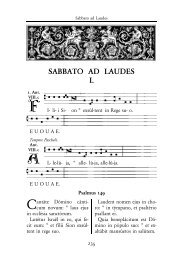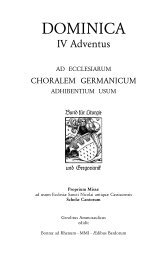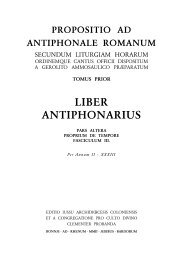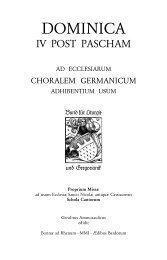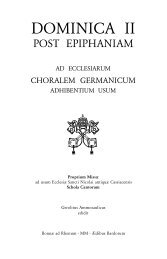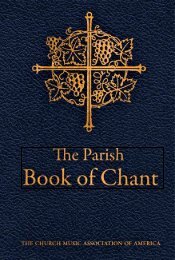The Bugnini-Liturgy and the Reform of the Reform - MusicaSacra
The Bugnini-Liturgy and the Reform of the Reform - MusicaSacra
The Bugnini-Liturgy and the Reform of the Reform - MusicaSacra
You also want an ePaper? Increase the reach of your titles
YUMPU automatically turns print PDFs into web optimized ePapers that Google loves.
a new construction invented on <strong>of</strong>fice desks or at conference tables, but<br />
solely <strong>the</strong> Roman rite, <strong>the</strong> unbroken tradition represented in any form.<br />
This does not mean that in my opinion <strong>the</strong> Roman liturgy ought to be<br />
celebrated according to <strong>the</strong> Tridentine rite <strong>and</strong> without any changes. I do<br />
not deny that a reform <strong>of</strong> <strong>the</strong> Roman liturgy was topical at <strong>the</strong> end <strong>of</strong> <strong>the</strong><br />
20 th century. Nei<strong>the</strong>r do I claim that a reform should have been based on<br />
<strong>the</strong> Tridentine rite by all means. Yet in reality it should have started from <strong>the</strong><br />
Tridentine rite as a status quo <strong>and</strong> a liturgical order worth honoring, yielding<br />
much fruit in <strong>the</strong> life <strong>of</strong> <strong>the</strong> Church even in our century, a cult deeply<br />
rooted in <strong>the</strong> hearts <strong>and</strong> connected with <strong>the</strong> piety <strong>of</strong> <strong>the</strong> people. But <strong>the</strong><br />
Tridentine rite is no more than one <strong>and</strong> perhaps not <strong>the</strong> most perfect form<br />
<strong>of</strong> <strong>the</strong> Roman liturgy. In a true "reform" <strong>the</strong> medieval traditions <strong>of</strong> <strong>the</strong> dioceses<br />
<strong>and</strong> <strong>the</strong> orders, <strong>the</strong> relics <strong>of</strong> <strong>the</strong> Old Roman rite <strong>and</strong>, <strong>of</strong> course, certain<br />
requirements <strong>of</strong> our age should have been taken into consideration.<br />
All this could have been achieved without ab<strong>and</strong>oning <strong>the</strong> domain <strong>of</strong> <strong>the</strong><br />
"Roman liturgy."<br />
To sum up: By turning against <strong>the</strong> Tridentine rite <strong>the</strong> <strong>Bugnini</strong> liturgy<br />
turned in fact against <strong>the</strong> whole Roman liturgical tradition. <strong>The</strong> <strong>Bugnini</strong> liturgy<br />
cannot be placed in <strong>the</strong> same category with <strong>the</strong> family <strong>of</strong> <strong>the</strong> Roman<br />
liturgy consisting <strong>of</strong> various partial traditions, homogeneous in essence <strong>and</strong><br />
nicely varied in detail. It fits more comfortably into <strong>the</strong> set <strong>of</strong> short-lived<br />
renaissance, Neo-Gallican, "aufklarist" reform liturgies from <strong>the</strong> 16 th to <strong>the</strong><br />
18 th <strong>and</strong> 19 th centuries. This group <strong>of</strong> reform liturgies is <strong>the</strong> same which<br />
provoked <strong>the</strong> resistance <strong>of</strong> <strong>the</strong> great personalities <strong>of</strong> <strong>the</strong> 19 th —20 th century<br />
liturgical movement <strong>and</strong> which prompted <strong>the</strong>m to evolve <strong>the</strong>ir own <strong>the</strong>ology<br />
<strong>and</strong> liturgical practice. It is a tragic fact that <strong>the</strong> liturgical movement was<br />
defeated at <strong>the</strong> point when it "gained <strong>the</strong> victory."<br />
2.<br />
<strong>The</strong> Holy Week is one <strong>of</strong> <strong>the</strong> most important elements <strong>of</strong> our liturgy.<br />
It is <strong>the</strong> center <strong>of</strong> <strong>the</strong> whole year <strong>and</strong> its condition influences <strong>the</strong> whole<br />
liturgical life considerably. It is an exceptional period not only as regards its<br />
contents but also in its liturgical forms, worthy <strong>of</strong> <strong>the</strong> contents. In establishing<br />
<strong>the</strong> rite <strong>of</strong> <strong>the</strong> Holy Week some inner laws <strong>of</strong> <strong>the</strong> liturgy played a part in<br />
24


